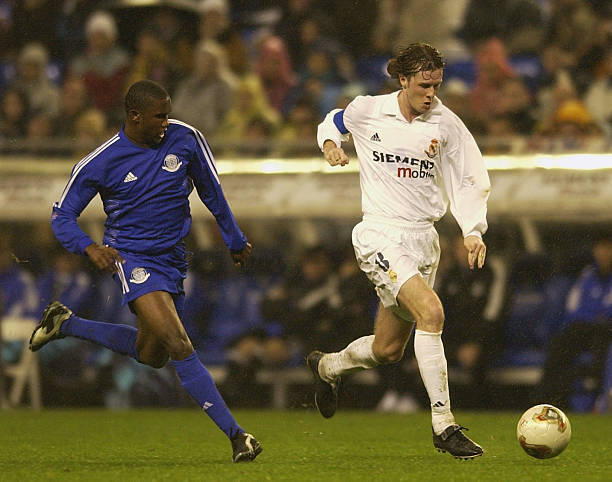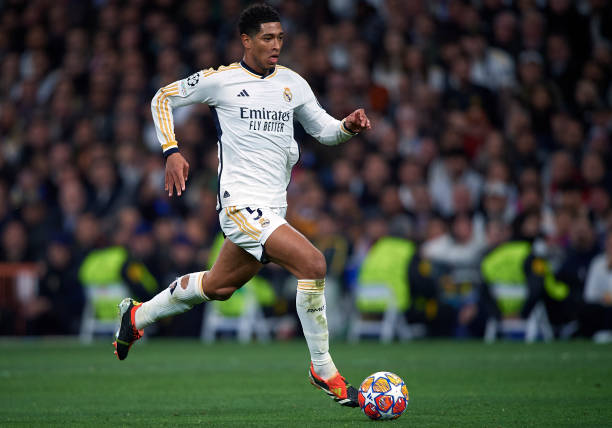22nd September 2005. Finally! English defender Jonathan Woodgate was to make his first appearance in the all white of Real Madrid. 80,000 people in the Santiago Bernabeu, what should have been a routine home game against Athletic Bilbao.. what could possibly go wrong?
Well as it turns out, everything. An own goal and a red card later, the defender, who joined Madrid for £13.4m a year earlier from Newcastle United, had endured just about the worst debut imaginable.
Woodgate would go on to make just nine further appearances for Los Blancos, signing for Middlesbrough the following summer.
The defender's story is not to say that there weren't also British players succeeding abroad at the time, the likes of Michael Robinson, Gary Lineker, David Beckham and Steve McManaman would definitely testify to the contrary, but it definitely wasn't as frequent as it is now.
So, what changed? Why are players going abroad in numbers and succeeding?
A refinement of the British Game
It's a stereotype, but sometimes stereotypes are true. Before the arrival of (especially) Arsene Wenger to the Premier League, the English game was still quite tactically raw and unrefined.
Although the likes of Liverpool and Manchester United had had success in Europe in previous decades, the top flight was still stuck in a time warp of direct, physical, 4-4-2 football that had come to characterise the game in Britain.
Arriving from a spell in Japan having been exposed to the benefits of a good diet and more sophisticated training methods, Frenchman Wenger set about revolutionising the culture of his club, first eradicating a drinking culture that had pervaded the English game in general and then daring to think differently on a tactical level.
Despite predictable derision upon his arrival, his success paved the way for a greater understanding of the game as more teams became aware of the importance of good preparation and tactical flexibility.
Following Wenger, there was the mid 2000s pragmatic revolution, in which José Mourinho and Rafael Benitez accentuated the importance of the old mantra " Attack wins games, defence wins titles". Introducing the 4-3-3 formation to the wider English conscience, the Portuguese broke the Manchester United/Arsenal hegemony by winning two Premier League titles and setting Chelsea on course for a decade and a half of steady success.
And then of course we have to talk about the big two. Jurgen Klopp and Pep Guardiola arrived in the Premier League with rock-solid reputations as pioneers of the game: Klopp for his relentless, energy-sapping Gegenpressing and Guardiola for his possession-based style which involved a more active role for the goalkeeper in starting attacks.
Almost a decade later, both have changed the game in this country beyond recognition, with teams at all levels determined to emulate their way of playing.
These changes over the course of the past three decades have created a new breed of English player. After years of underachievement in international tournaments relying on the brilliance of individuals and coming up short in clutch moments, English football has undergone a radical cultural change that the likes of France and Germany went through in the late 1990s/early 2000s, realising that they had been left behind and constructing new, improved facilities such as the St Georges Park training centre, instilling a common philosophy among all age groups in order to produce teams capable of playing expansive, technical football to compete with the best.
English players who play their club football under the innovative, forward-thinking coaches mentioned above are much more technically rounded and tactically flexible than their counterparts of years gone by. Gone are the days where English defenders would look to get rid of the ball as soon as they received it, instead they are expected to actively participate in build-up and orchestrate attacks.
Players ready to adapt
As a result of the evolution of the game, British players are now more tactically and culturally adaptable than ever. Whilst obvious generational talents like Bellingham make headlines, there are plenty more less heralded players making waves in Europe. The likes of Jadon Sancho and Ruben Loftus-Cheek are in the process of re-igniting stuttering careers in the Bundesliga and Serie A respectively, whereas another AC Milan star in Fikayo Tomori is performing consistently for the Rossoneri, speaking fluent Italian and somehow getting overlooked by Gareth Southgate for England squads.
Indeed, cultural adaptation is just as important. In the past, we have seen the likes of Steve McManaman remembered much more fondly by his club's fans for having bothered to learn the language whilst others like David Beckham and Michael Owen didn't. Being able to effectively communicate with teammates and integrate into the local culture is a huge advantage, and one that will determine whether the likes of Bellingham, who is currently learning Spanish, will be remembered as a true Madridista or just another one of many very good players to have graced the Spanish capital. 
Things are looking up for the England national team. Players are no longer scared to go and try new experiences abroad, with arguably England's two best players in Bellingham and Harry Kane currently plying their trade away from the Premier League. With Gareth Southgate's men amongst the favourites for this summer's Euro 2024, having players with different experiences and a taste of other cultures might be the difference between much-needed success or another glorious failure.









































